| Listing 1 - 7 of 7 |
Sort by
|
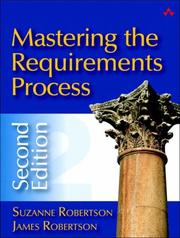
ISBN: 0321419499 9780321419491 Year: 2011 Publisher: Upper Saddle River, N.J. Addison-Wesley
Abstract | Keywords | Export | Availability | Bookmark
 Loading...
Loading...Choose an application
- Reference Manager
- EndNote
- RefWorks (Direct export to RefWorks)
Project management --- 681.3*D21 --- Industrial project management --- Management --- 681.3*D21 Requirements/specifications: languages; methodologies; tools (Software engineering)--See also {681.3*D31} --- Requirements/specifications: languages; methodologies; tools (Software engineering)--See also {681.3*D31} --- Computer architecture. Operating systems --- ICT (informatie- en communicatietechnieken) --- systeemontwikkeling (informatica) --- prototyping --- informatica --- 681.3*D2 --- 681.3*D2 Software engineering: protection mechanisms; standards--See also {681.3*K63}; {681.3*K51} --- Software engineering: protection mechanisms; standards--See also {681.3*K63}; {681.3*K51} --- informatique --- Management Information System --- systeemontwikkeling --- 681.3* / / / / / / / / / / / / / / / / / / / / / / / / / / / / --- Computer science --- Systeemontwikkeling
Book
ISBN: 3540739165 9783540739159 3540739157 9783540739166 3642093159 Year: 2008 Publisher: Berlin, Heidelberg : Springer Berlin Heidelberg : Imprint: Springer,
Abstract | Keywords | Export | Availability | Bookmark
 Loading...
Loading...Choose an application
- Reference Manager
- EndNote
- RefWorks (Direct export to RefWorks)
Numerous readers of the second edition have noti?ed me about misprints and possible improvements of the text and the associated computer codes. The resulting modi?cations have been incorporated in this new edition and its accompanying software. The major change between the second and third editions, however, is caused by the new implementation of Numerical Python, now called numpy. The new numpy package encourages a slightly di?erent syntax compared to the old Numeric implementation, which was used in the previous editions. Since Numerical Python functionality appears in a lot of places in the book, there are hence a huge number of updates to the new suggested numpy syntax, especially in Chapters 4, 9, and 10. The second edition was based on Python version 2.3, while the third edition contains updates for version 2.5. Recent Python features, such as generator expressions (Chapter 8.9.4), Ctypes for interfacing shared libraries in C (Chapter 5.2.2), the with statement (Chapter 3.1.4), and the subprocess module for running external processes (Chapter 3.1.3) have been exempli?ed to make the reader aware of new tools. Chapter 4.4.4 is new and gives a taste of symbolic mathematics in Python.
Python (Computer program language) --- Science --- Data processing. --- Electronic data processing --- Scripting languages (Computer science) --- Python (Computer program language). --- 519.6 --- 681.3*D31 --- 681.3*g --- 519.6 Computational mathematics. Numerical analysis. Computer programming --- Computational mathematics. Numerical analysis. Computer programming --- 681.3*D31 Formal definitions and theory: semantics; syntax (Programming languages)--See also {681.3*D21}; {681.3*F31}; {681.3*F32}; {681.3*F42}; {681.3*F43} --- Formal definitions and theory: semantics; syntax (Programming languages)--See also {681.3*D21}; {681.3*F31}; {681.3*F32}; {681.3*F42}; {681.3*F43} --- Data processing --- Computer science. --- Software engineering. --- Engineering. --- Computational Science and Engineering. --- Numerical and Computational Physics, Simulation. --- Software Engineering/Programming and Operating Systems. --- Computational Intelligence. --- Construction --- Industrial arts --- Technology --- Computer software engineering --- Engineering --- Informatics --- Computer mathematics. --- Physics. --- Computational intelligence. --- Computer mathematics --- Mathematics --- Natural philosophy --- Philosophy, Natural --- Physical sciences --- Dynamics --- Intelligence, Computational --- Artificial intelligence --- Soft computing --- Computer science --- Mathematics.
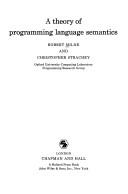
ISBN: 0412142600 9780412142604 Year: 1976 Publisher: London: Chapman and Hall,
Abstract | Keywords | Export | Availability | Bookmark
 Loading...
Loading...Choose an application
- Reference Manager
- EndNote
- RefWorks (Direct export to RefWorks)
Artificial intelligence. Robotics. Simulation. Graphics --- Programming languages (Electronic computers) --- Langages de programmation --- Syntax --- Semantics --- Syntaxe --- Sémantique --- 681.3*D31 --- 681.3*F3 --- 681.3*F32 --- 681.3*F4 --- Formal definitions and theory: semantics; syntax (Programming languages)--See also {681.3*D21}; {681.3*F31}; {681.3*F32}; {681.3*F42}; {681.3*F43} --- Logics and meanings of programs (Theory of computation) --- Semantics of programming languages: algebraic approaches to semantics; denotational semantics; operational semantics (Logics and meanings of programs)--See also {681.3*D31} --- Mathematical logic and formal languages (Theory of computation) --- 681.3*F4 Mathematical logic and formal languages (Theory of computation) --- 681.3*F32 Semantics of programming languages: algebraic approaches to semantics; denotational semantics; operational semantics (Logics and meanings of programs)--See also {681.3*D31} --- 681.3*F3 Logics and meanings of programs (Theory of computation) --- 681.3*D31 Formal definitions and theory: semantics; syntax (Programming languages)--See also {681.3*D21}; {681.3*F31}; {681.3*F32}; {681.3*F42}; {681.3*F43} --- Syntax. --- Semantics. --- Informatique --- Computer science --- Sémantique
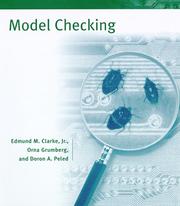
ISBN: 0262292742 0262270455 0585385580 9780585385587 9780262270458 0262032708 9780262032704 9780262292740 0262032708 9780262032704 Year: 1999 Publisher: Cambridge, Mass. : MIT Press,
Abstract | Keywords | Export | Availability | Bookmark
 Loading...
Loading...Choose an application
- Reference Manager
- EndNote
- RefWorks (Direct export to RefWorks)
Computer systems --- Engineering & Applied Sciences --- Computer Science --- Verification of computer systems --- Verification. --- Verification --- 681.3*D24 --- 681.3*F22 --- 681.3*F31 --- 681.3*F22 Nonnumerical algorithms and problems: complexity of proof procedures; computations on discrete structures; geometrical problems and computations; pattern matching --See also {?681.3*E2-5}; {681.3*G2}; {?681.3*H2-3} --- Nonnumerical algorithms and problems: complexity of proof procedures; computations on discrete structures; geometrical problems and computations; pattern matching --See also {?681.3*E2-5}; {681.3*G2}; {?681.3*H2-3} --- 681.3*F31 Specifying anf verifying and reasoning about programs: assertions; invariants; mechanical verification; pre- and post-conditions (Logics and meanings of programs)--See also {681.3*D21}; {681.3*D24}; {681.3*D31}; {681.3*E1} --- Specifying anf verifying and reasoning about programs: assertions; invariants; mechanical verification; pre- and post-conditions (Logics and meanings of programs)--See also {681.3*D21}; {681.3*D24}; {681.3*D31}; {681.3*E1} --- 681.3*D24 Program verification: assertion checkers; correctness proofs; reliability; validation (Software engineering)--See also {681.3*F31} --- Program verification: assertion checkers; correctness proofs; reliability; validation (Software engineering)--See also {681.3*F31} --- Informatique --- Computer science --- Systèmes informatiques --- Vérification --- Artificial intelligence. Robotics. Simulation. Graphics

ISBN: 9780387095110 9780387095103 0387095101 038709511X 354009511X 3540351639 3540095101 354035168X 9783540095118 9783540095101 Year: 1979 Volume: 70 Publisher: Berlin: Springer,
Abstract | Keywords | Export | Availability | Bookmark
 Loading...
Loading...Choose an application
- Reference Manager
- EndNote
- RefWorks (Direct export to RefWorks)
Introductory MEMS: Fabrication and Applications is a practical introduction to MEMS for advanced undergraduate and graduate students. Part I introduces the student to the most commonly used MEMS fabrication techniques as well as the MEMS devices produced using these techniques. Part II focuses on MEMS transducers: principles of operation, modeling from first principles, and a detailed look at commercialized MEMS devices, in addition to microfluidics. Multiple field-tested laboratory exercises are included, designed to facilitate student learning about the fundamentals of microfabrication processes. References, suggested reading, review questions, and homework problems are provided at the close of each chapter. Introductory MEMS: Fabrication and Applications is an excellent introduction to the subject, with a tested pedagogical structure and an accessible writing style suitable for students at an advanced undergraduate level across academic disciplines. .
Engineering. --- Electronics and Microelectronics, Instrumentation. --- Circuits and Systems. --- Mechanics. --- Surfaces and Interfaces, Thin Films. --- Continuum Mechanics and Mechanics of Materials. --- Materials. --- Electronics. --- Systems engineering. --- Surfaces (Physics). --- Ingénierie --- Mécanique --- Matériaux --- Electronique --- Ingénierie des systèmes --- Surfaces (Physique) --- Microelectromechanical systems. --- Electronic apparatus and appliances. --- Transducers. --- Electronic books. -- local. --- Microelectromechanical systems --- Electronic apparatus and appliances --- Transducers --- Electrical & Computer Engineering --- Engineering & Applied Sciences --- Electrical Engineering --- Electronic devices --- Electronics --- MEMS (Microelectromechanical systems) --- Micro-electro-mechanical systems --- Micro-machinery --- Microelectromechanical devices --- Micromachinery --- Micromachines --- Micromechanical devices --- Micromechanical systems --- Apparatus and appliances --- 681.3*A0 --- 681.3*D31 --- 681.3*F12 --- Formal definitions and theory: semantics syntax (Programming languages)--See also {681.3*D21} {681.3*F31} {681.3*F32} {681.3*F42} {681.3*F43} --- Process management: concurrency deadlocks multiprocessing/multiprogrammingmutual exclusion scheduling synchronization (Operating systems) --- Modes of computation: alternation and nondeterminism parallelism probabilistic computation relations among modes relativized computation --- 681.3*F12 Modes of computation: alternation and nondeterminism parallelism probabilistic computation relations among modes relativized computation --- 681.3*D41 Process management: concurrency deadlocks multiprocessing/multiprogrammingmutual exclusion scheduling synchronization (Operating systems) --- 681.3*D31 Formal definitions and theory: semantics syntax (Programming languages)--See also {681.3*D21} {681.3*F31} {681.3*F32} {681.3*F42} {681.3*F43} --- Sequential Machine Theory --- FORMAL LANGUAGES --- Continuum mechanics. --- Microelectronics. --- Electronic circuits. --- Materials --- Thin films. --- Surfaces. --- Programming --- Computer science --- #TCPW P4.0 --- #TCPW P4.6 --- 681.3*D41 --- 681.3*F3 --- 681.3*F3 Logics and meanings of programs (Theory of computation) --- Logics and meanings of programs (Theory of computation) --- 681.3*F12 Modes of computation: alternation and nondeterminism; parallelism; probabilistic computation; relations among modes; relativized computation --- Modes of computation: alternation and nondeterminism; parallelism; probabilistic computation; relations among modes; relativized computation --- 681.3*D41 Process management: concurrency; deadlocks; multiprocessing/multiprogramming;mutual exclusion; scheduling; synchronization (Operating systems) --- Process management: concurrency; deadlocks; multiprocessing/multiprogramming;mutual exclusion; scheduling; synchronization (Operating systems) --- 681.3*A0 General --- General --- 681.3*D31 Formal definitions and theory: semantics; syntax (Programming languages)--See also {681.3*D21}; {681.3*F31}; {681.3*F32}; {681.3*F42}; {681.3*F43} --- Formal definitions and theory: semantics; syntax (Programming languages)--See also {681.3*D21}; {681.3*F31}; {681.3*F32}; {681.3*F42}; {681.3*F43} --- 681.3*F0 --- 681.3*F4 --- 681.3*F4 Mathematical logic and formal languages (Theory of computation) --- Mathematical logic and formal languages (Theory of computation) --- Computerwetenschap--?*F0 --- Electric apparatus and appliances --- Electromechanical devices --- Physical instruments --- Scientific apparatus and instruments --- Electronic instruments --- Microtechnology --- Mechatronics --- Parallel processing (Electronic computers) --- Programming languages (Electronic computers) --- Congresses --- Semantics --- Parallélisme (Informatique) --- Langages de programmation --- Congrès --- Sémantique --- Mechanics, Applied. --- Classical Mechanics. --- Solid Mechanics. --- Applied mechanics --- Engineering, Mechanical --- Engineering mathematics --- Physics --- Surface chemistry --- Surfaces (Technology) --- Classical mechanics --- Newtonian mechanics --- Dynamics --- Quantum theory --- Engineering systems --- System engineering --- Engineering --- Industrial engineering --- System analysis --- Electrical engineering --- Physical sciences --- Design and construction --- Materials—Surfaces. --- Films, Thin --- Solid film --- Solid state electronics --- Solids --- Coatings --- Thick films --- Microminiature electronic equipment --- Microminiaturization (Electronics) --- Semiconductors --- Miniature electronic equipment --- Electron-tube circuits --- Electric circuits --- Electron tubes --- Logic design. --- Software engineering. --- Logics and Meanings of Programs. --- Software Engineering. --- Information theory. --- Theory of Computation. --- Software Engineering/Programming and Operating Systems. --- Computer software engineering --- Design, Logic --- Design of logic systems --- Digital electronics --- Electronic circuit design --- Logic circuits --- Machine theory --- Switching theory --- Communication theory --- Communication --- Cybernetics --- Logique --- Programmation système (informatique) --- Parallel processing (Electronic computers) - Congresses --- Programming languages (Electronic computers) - Semantics - Congresses --- Sequential Machine Theory - Congresses --- FORMAL LANGUAGES - Congresses --- Programming languages (Electronic computers) - Congresses --- Langages de programmation.
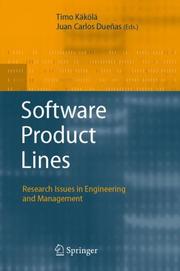
ISBN: 1280803762 9786610803767 3540332537 3540332529 364206986X 9783540332527 Year: 2006 Publisher: Berlin: Springer,
Abstract | Keywords | Export | Availability | Bookmark
 Loading...
Loading...Choose an application
- Reference Manager
- EndNote
- RefWorks (Direct export to RefWorks)
Between July 1999 and June 2005 a group of European companies, research institutes, and universities executed the EUREKA-ITEA projects ESAPS, CAFÉ, and FAMILIES on the topic of product line engineering. The projects originated from the need of the industry to improve software engineering performance by organizing product development in product lines. The results obtained within the projects have been implemented in several large industries (e.g., automotive, e-business, medical systems, and mobile phones). They involve a radical shift in software construction and production. The most important research results of the projects are collected in this book. Product line engineering was already applied within industry in the 1980s and presumably earlier. In the 1980s, good architects in many telecommunications c- panies based their architectures on the ideas of David Parnas, who published on the subject of program families . They were facilitated by the CHILL language widely used by the telecommunications companies. This language deploys the same modularity principles as the Modula programming language family. Modularity is a crucial ingredient for implementing systems with a component-based architecture. Being able to compose the products of components is an important mechanism in all product line architectures. In the 1990s, the product line ideas started to gain ground in other industries. Around 1995, the company experiences reached the academia and since then people in companies and academia have collaborated widely on this subject. The ESAPS, CAFÉ, and FAMILIES projects manifest an institutionalized form of this collaboration.
Computer software --- Software engineering. --- Development. --- Computer science. --- Management. --- Industrial management. --- Information technology. --- Business --- Economic policy. --- Computer Science. --- Software Engineering. --- IT in Business. --- Innovation/Technology Management. --- R & D/Technology Policy. --- Computer software engineering --- Engineering --- Economic nationalism --- Economic planning --- National planning --- State planning --- Economics --- Planning --- National security --- Social policy --- Electronic data processing --- IT (Information technology) --- Technology --- Telematics --- Information superhighway --- Knowledge management --- Business administration --- Business enterprises --- Business management --- Corporate management --- Corporations --- Industrial administration --- Management, Industrial --- Rationalization of industry --- Scientific management --- Management --- Industrial organization --- Administration --- Industrial relations --- Organization --- Informatics --- Science --- Data processing. --- Development of computer software --- Software development --- Information Technology --- Software Engineering --- Software engineering --- 681.3*D210 --- 681.3*D211 --- 681.3*D213 --- 681.3*D21 --- 681.3*D29 --- 681.3*K63 --- 681.3*K63 Software management: software development; software selection; software maintenance --- Software management: software development; software selection; software maintenance --- 681.3*D210 Design: methodologies; representation (Software engineering) --- Design: methodologies; representation (Software engineering) --- 681.3*D29 Management: copyrights; cost estimation; life cycle; productivity; programming teams; software configuration management; software quality assurance; SQA (Software engineering)--See also {681.3*K63}; {681.3*K64} --- Management: copyrights; cost estimation; life cycle; productivity; programming teams; software configuration management; software quality assurance; SQA (Software engineering)--See also {681.3*K63}; {681.3*K64} --- 681.3*D21 Requirements/specifications: languages; methodologies; tools (Software engineering)--See also {681.3*D31} --- Requirements/specifications: languages; methodologies; tools (Software engineering)--See also {681.3*D31} --- Development --- Software architectures: data abstractio, domain-specific architectures, information hiding, languages (e.g. description, interconnection, definition), patterns (e.g. client/server, pipeline, blackboard) --- Reusable software: domain engineering; reusable libraries; reuse models --- Business—Data processing. --- Computer software - Development
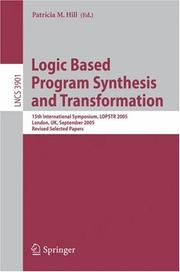
ISSN: 03029743 ISBN: 9783540326540 3540326545 3540326561 Year: 2006 Volume: 3901 Publisher: Berlin: Springer,
Abstract | Keywords | Export | Availability | Bookmark
 Loading...
Loading...Choose an application
- Reference Manager
- EndNote
- RefWorks (Direct export to RefWorks)
Logic programming --- Programmation logique --- Congresses. --- Congrès --- Computer Science --- Engineering & Applied Sciences --- 681.3*I22 --- 681.3*F31 --- 681.3*D11 --- 681.3*D16 --- 681.3*D24 --- 681.3*F41 --- Automatic programming: automatic analysis of algorithms; program modification; program synthesis; program transformation; program verification (Artificialintelligence)--See also {681.3*D12}; {681.3*F31} --- Specifying anf verifying and reasoning about programs: assertions; invariants; mechanical verification; pre- and post-conditions (Logics and meanings of programs)--See also {681.3*D21}; {681.3*D24}; {681.3*D31}; {681.3*E1} --- Applicative (functional) programming --- Programming techniques: Logic programming --- Program verification: assertion checkers; correctness proofs; reliability; validation (Software engineering)--See also {681.3*F31} --- Mathematical logic: computability theory; computational logic; lambda calculus; logic programming; mechanical theorem proving; model theory; proof theory;recursive function theory--See also {681.3*F11}; {681.3*I22}; {681.3*I23} --- 681.3*F41 Mathematical logic: computability theory; computational logic; lambda calculus; logic programming; mechanical theorem proving; model theory; proof theory;recursive function theory--See also {681.3*F11}; {681.3*I22}; {681.3*I23} --- 681.3*D24 Program verification: assertion checkers; correctness proofs; reliability; validation (Software engineering)--See also {681.3*F31} --- 681.3*D11 Applicative (functional) programming --- 681.3*F31 Specifying anf verifying and reasoning about programs: assertions; invariants; mechanical verification; pre- and post-conditions (Logics and meanings of programs)--See also {681.3*D21}; {681.3*D24}; {681.3*D31}; {681.3*E1} --- 681.3*I22 Automatic programming: automatic analysis of algorithms; program modification; program synthesis; program transformation; program verification (Artificialintelligence)--See also {681.3*D12}; {681.3*F31} --- Computer science. --- Computer programming. --- Computer logic. --- Mathematical logic. --- Artificial intelligence. --- Computer Science. --- Logics and Meanings of Programs. --- Artificial Intelligence (incl. Robotics). --- Programming Techniques. --- Mathematical Logic and Formal Languages. --- AI (Artificial intelligence) --- Artificial thinking --- Electronic brains --- Intellectronics --- Intelligence, Artificial --- Intelligent machines --- Machine intelligence --- Thinking, Artificial --- Bionics --- Cognitive science --- Digital computer simulation --- Electronic data processing --- Logic machines --- Machine theory --- Self-organizing systems --- Simulation methods --- Fifth generation computers --- Neural computers --- Algebra of logic --- Logic, Universal --- Mathematical logic --- Symbolic and mathematical logic --- Symbolic logic --- Mathematics --- Algebra, Abstract --- Metamathematics --- Set theory --- Syllogism --- Computer science logic --- Logic, Symbolic and mathematical --- Computers --- Electronic computer programming --- Electronic digital computers --- Programming (Electronic computers) --- Coding theory --- Informatics --- Science --- Programming --- Logic design. --- Artificial Intelligence. --- Design, Logic --- Design of logic systems --- Digital electronics --- Electronic circuit design --- Logic circuits --- Switching theory --- Logic programming - Congresses. --- Machine theory. --- Computer Science Logic and Foundations of Programming. --- Formal Languages and Automata Theory. --- Abstract automata --- Abstract machines --- Automata --- Mathematical machine theory --- Algorithms --- Recursive functions --- Robotics
| Listing 1 - 7 of 7 |
Sort by
|

 Search
Search Feedback
Feedback About UniCat
About UniCat  Help
Help News
News